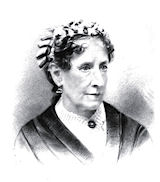Norwich, August 16th, 1862.
My own dear Son:
After having received intimations from various sources of the almost certainty of your appointment to the Lt. Colonelcy of the Eighteenth, you may imagine the crushing disappointment produced by the order from the War Department forbidding the removal of all officers from their present positions. Col. Ely is very anxious to have you with him. Ned Tyler told me that Ely said to the Gov.: “If you will appoint the officers I wish, I will be responsible for the reputation of the Regiment. If, however, you put in mere politicians I cannot.” I feel the sickness of “hope deferred” this morning, and my heart is very heavy. Well, I cannot resist all influences, and though I have brave hours, I have times of bitter struggling. Well, this is useless as well as discouraging to you. Pardon me, my son. I shall soon recover from this unworthy despondency. I am much gratified by the interest shown by your friends here. Mr. Johnson (Charlie’s father) told Lillie the pressure upon the Gov. from Norwich people on your behalf had been very great, the matter was now decided, and you would probably be with us next week, still, he said, we must not be too sure, for “there’s many a slip ‘twixt the cup and the lip.” For Gen. Tyler’s affectionate interest, I must always be very grateful. He has returned to Connecticut to take charge of the Regiments now preparing in the State. He has taken great interest in you always. Perhaps I am unreasonable in my disappointment at not seeing you, but I do feel you might have been appointed earlier, before these orders were issued.
We are all well, and anxiously watching for news from Burnside. I have sent to New-York for a flag to wave from our old home, the home of your childhood. I intended it to greet your return. I shall place it over the front entrance so that all who pass in or out must walk under its folds. Hunt just passing the door called out, “give my love to Will.” All are interested and excited about the new Regiments. The Twenty-second goes into camp in Norwich, on the Fair Grounds. Eating, drinking, or sleeping, our thoughts are on the war and the precious lives at stake, as well as the great issue involved. Bromley is Captain of a Company, and young Merwin his first Lieutenant. Morton Hale is a Lieutenant in one of the companies; he is to be married next Tuesday to Emily Huntington. Her sister Hannah was engaged to Charlie Breed.
Good-bye, my own dear, dear son. My whole trust is placed in the mercy of God, to whom I earnestly pray for your deliverance from all evil. God bless you wherever you may be is the cry of my anxious, loving heart.
Always lovingly,
Mother.
New London has furnished one private and an Adjutant —wants a field officer besides. They have sent four hundred men to the Fourteenth. I have just heard that perhaps the staff officers are not included in this order from the Department. Gen. Tyler will be at home this evening, when I shall learn.



